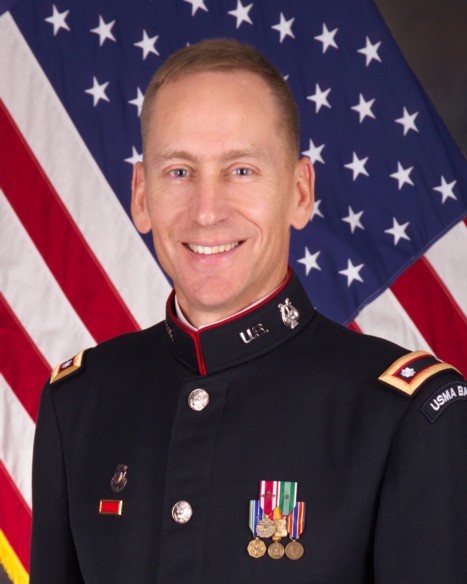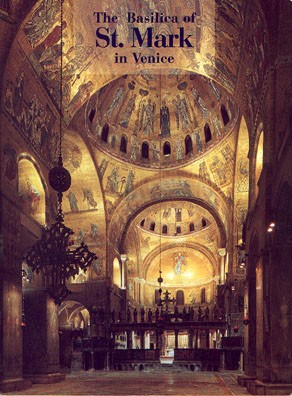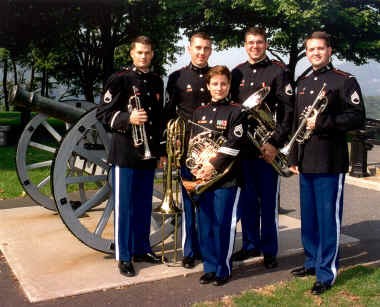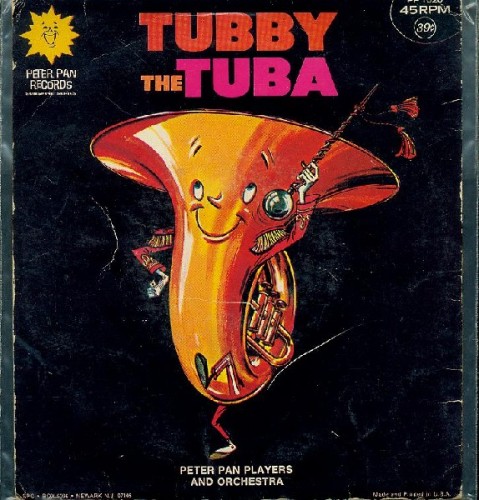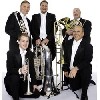Hark the Herald: The NY Philharmonic Brass
Guest Brass from West Point Blast Away!
By: Susan Hall - Dec 14, 2009
New York Philharmonic Principal Brass Quintet
West Point Concert Band Brass and Percussion
West Point Trombone Ensemble< Hellcats
Lt. Col. Timothy J. Holtan, Commander/Conductor
Avery Fisher Hall
Lincoln Center
December 13
The principal brass of the New York Philharmonic, heralding the holiday season, an annual event inaugurated about 15 years ago, invited the brass section of the United State Military Academy Concert Band to bring the holiday season. We didn't hear "Oy to the world," but there was a bit of Dreidel, along with new versions of "Jingle Bells" and "Silent Night." It was a raucous, exuberant afternoon, conducted by Lt. Col. Timothy J. Holtan of the Academy. Philip Smith, the Philharmonic's principal trumpet, was a spokesman and guide.
The brass section is a Philharmonic flank that splits off during the year and performs throughout the world. Their sheer joy in performance must captivate audiences everywhere. On Sunday, they entered in red caps, and Philip Myers, the French horn, was fully decked out as Santa Claus. While blowing on his horn, he let out a joyful Ho! Ho! Ho! He is certainly the most impish of rhe group. His horn playing is seriously gorgeous, however. Great performers often combine impishness and art. Perhaps Myers' wildness comes from having to play with his hand in the bell of his instrument -- and he just needs to burst out from time to time.
The Quintet was dressed in white tie and tails -- de rigueur for Nobelists, but an obvious effort to at least try to come up to the standard set by all those brass-covered West Point uniforms. The Quintet clearly likes being sprung into prominence from their usual positions seated behind the strings.
Talk about rehearsals at West Point focused on the Philharmonic tuba principal, Alan Baer, who had trouble getting past the gates -- security with an instrument big enough to hold ....? What would Tubby make of that! Tubby the Tuba, a children's classic, came to the fore one week after Pearl Harbor was bombed in 1941 and the tuba became an instant hit. The instrument had finally found a melody to play. "I can sing too," said Tubby. Richard Wagner and Hector Berlioz had already begun to champion the tuba in their works. Richard Strauss composed his "Second Concerto for Horn" in 1942. In 1954 Ralph Vaughan Williams composed his "Bass Tuba Concerto."
Brass, of course, has historically been associated with the military and hunting. Jazz called attention to its lyric potential. The singing of the brass is surely what we heard on Sunday, as each of the often overlooked instruments revealed melodies in the music performed. No question that a trombone can sing with as beautiful and shaped a line as any other instrument. Trombones were striking in a rendition of "We Three Kings."
The Lieutenant Colonel noted that at St. Mark's in Venice the brass had been scattered throughout the church so that listeners had music coming at them in surround sound. Those of us who have been in the halls designed by Frank Gehry know that he always includes sound expert Yasuhisa Toyota so that listeners will be encircled by sound.
In 1597 Italian composer Giovanni Gabrieli, then the organist at St. Mark's, composed the earliest known piece to call for specific brass instruments, "Sonate pian'forte." The Philharmonic brass quintet and members of the concert band brass and percussion played Gabrieli's Canzon XVI -- where all of this brass began. The Lieutenant Colonel's conducting style was a bit up tight, but appropriate for a military man.
Trumpeter Louis Armstrong and trombonist Tommy Dorsey are only two of the jazz brass players whose technical abilities impressed classical musicians and raised the standard of technical ability for brass musicians. Maybe that's why Philip Smith dumped Bizet (announced in the program) in favor of an Ella Fitzgerald song, "Do Nothing Till You Hear from Me," a Tango and "Caravan," associated with a Duke Ellington trombonist. We have to be reminded, as Tubby said, that the brass can sing. The tuba performing jazz on Sunday was something to behold -- the kids in the audience were astounded by all that hot air generated by serial puffs and releases.
The Rimmer "Punchinello" sounded like we were all preparing for "The Charge of the Light Brigade," although Rimmer was not born until 1862. He was a well-known composer of marches and a brilliant performer on the cornet, a musician who probably grew up on the Tennyson poem. This reminder, as cheerfully as it was presented, was too close to our current military efforts for comfort.
When he undertook the "Johnson Rag," trumpeter Smith asked, "What does this have to do with Christmas," and quickly answered, "Nothing, except a small gold trumpet," which he picked up along the way to play for a too brief moment. Twinkles and stars abounded.
A holiday jubilee preceded announced encores ("We've always got encores ready") -- and I don't think anything was left out: "Frosty the Snowman," "Jingle Bells" and Dreidels again, "I Saw Mommy Kissing Santa Claus," Rudolph and on and on into a winter wonderland.
Smith invited us to sing along with "Silent Night," but cautioned that we should watch the rhythm. Bells and brass are traditional sounds of the holiday season, and on Sunday they came not from brass instruments, but from the hearts of the musicians.
I would not want to be a member of the string section when the full orchestra reconvenes. All the brass murmured and moaned about the strings' prominence in the orchestra, and were prepared to overwhelm them as the orchestra assembles for Webern and Mozart right after Christmas and Copland and Gershwin on New Year's Eve. Perhaps bloodied but defended by the conductor, a son of strings, the orchestra I am sure will continue as a magnificent whole.
Don't miss other holiday celebrations: Handel's Messiah on December 15-19 at 7:30 pm and pianist Leif Ove Andsnes with the orchestra on December 29, 30 and January 2. Who would miss the special New Year's Eve concert with artist-in-residence, baritone Thomas Hampson?

